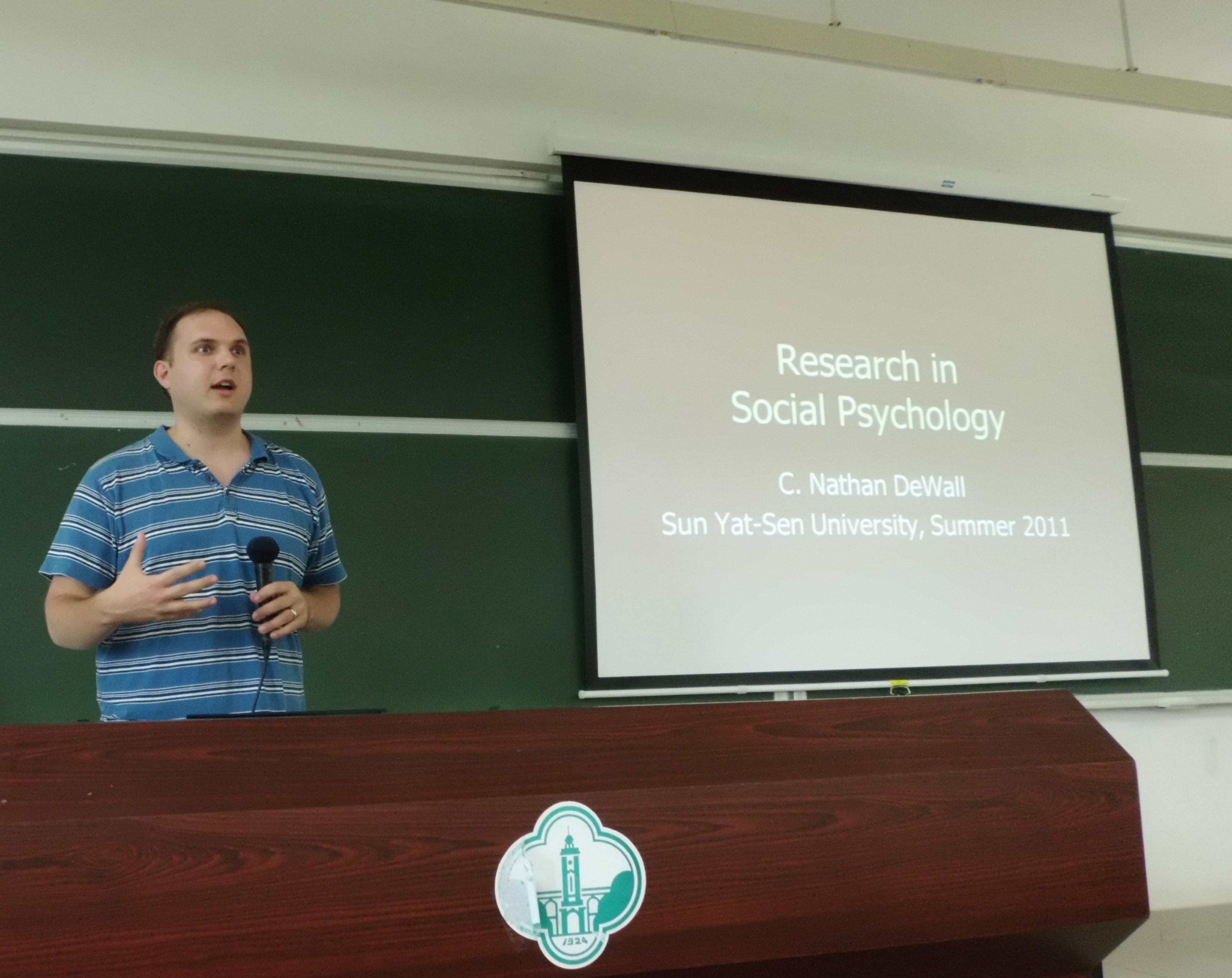Off DeWall: Nothing Lost in Translation
Yesterday I gave a speech at the Department of Psychology that covered my social exclusion research. It lasted about 90 minutes, which included time for me to field questions from the audience. I had a terrific time! But this isn’t a post about how great the talk went. That’s not up to me, and it’s none of my business. What struck me, from the second it started to when I floated up to my office afterwards, was that the talk made sense because it focused on something that’s true for most people—the need for close relationships, and the pain that ensues when those relationships crumble.
To be honest, my talk got off to a rocky start. My host, Xinyue Zhou, introduced me. This is completely normal. But it wasn’t like any other introduction I had ever experienced: she introduced me in Chinese. I caught about five words of her introduction (Nathan DeWall, social rejection, Kentucky). While I was listening to her, I wondered what else she was saying. Was she giving them special instructions about how to listen to my talk? Were they supposed to interject questions if something wasn’t clear? Did she forget to tell me that I had to give my talk in Chinese?


 What has two steering wheels, a roof, two rows of seats, and four wheels? You guessed it: a bicycle! Today, three students took me on an island cycling adventure. We went to an island just outside of Zhuhai, which faces the South China Sea. There were many people out there enjoying the weather and scenery, including small armies of young children collecting crabs they yanked from the rocks on the sea.
What has two steering wheels, a roof, two rows of seats, and four wheels? You guessed it: a bicycle! Today, three students took me on an island cycling adventure. We went to an island just outside of Zhuhai, which faces the South China Sea. There were many people out there enjoying the weather and scenery, including small armies of young children collecting crabs they yanked from the rocks on the sea. We began with course introductions and a brief lecture on how to think like a social psychologist. We focused on how social psychologists use the same scientific method that the “hard sciences” use, but that what we measure is often subjective. For example, you can’t go the local supermarket and order a six-pack of self-esteem. How, then, do you measure self-esteem when you can’t put your hands on it and toss it your backseat? It takes work, but you can devise clever and nifty ways to measure most psychological things you’re interested in.
We began with course introductions and a brief lecture on how to think like a social psychologist. We focused on how social psychologists use the same scientific method that the “hard sciences” use, but that what we measure is often subjective. For example, you can’t go the local supermarket and order a six-pack of self-esteem. How, then, do you measure self-esteem when you can’t put your hands on it and toss it your backseat? It takes work, but you can devise clever and nifty ways to measure most psychological things you’re interested in. Travelling to China takes a long time. After 24 hours of travelling (and two seriously delayed flights), I’m finally here! What, you might ask, was the first thing that I saw in the airport after getting off of my airplane? A Kentucky Fried Chicken Restaurant! KFC was the first American fast-food restaurant to open in China. I mentioned the KFC spotting to my hosts, who quickly pointed out how much they loved the Colonel’s recipe. I’m literally on the other side of the globe, yet I still feel very connected to my Kentucky roots.
Travelling to China takes a long time. After 24 hours of travelling (and two seriously delayed flights), I’m finally here! What, you might ask, was the first thing that I saw in the airport after getting off of my airplane? A Kentucky Fried Chicken Restaurant! KFC was the first American fast-food restaurant to open in China. I mentioned the KFC spotting to my hosts, who quickly pointed out how much they loved the Colonel’s recipe. I’m literally on the other side of the globe, yet I still feel very connected to my Kentucky roots. 